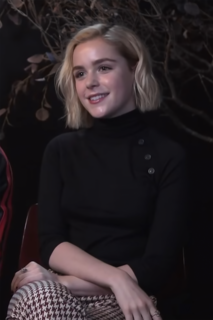A Quote by Catherine Hardwicke
Sometimes, you don't realize that something is actually a sidetrack for the story, or it takes the tension out of a scene.
Related Quotes
Occasionally, as an actor, you're not... Sometimes, at least for me, I'm not fully in the groove until the second or third take, in which I would not want to just stop. If it's a scene that takes a lot of work and time, sometimes the scene gets better with time, and sometimes it gets exhausted. I think it just depends on the scene.
Sometimes people that are very good at improvisation in life, meaning like stage improvisation, aren't good in films because you have to ultimately take a scene where it needs to go. It's not about just saying something that's funny. You can say something funny but if it's not on story or driving the scene to its end it's really not very helpful at all.
But for me, you also have to be conscious of what is going to play. And that includes playing with. Sometimes it's just a vibe. It's what's going to make this scene work. And sometimes there may be something that restricts you that has to do with something that maybe is historically accurate. And then you have to weigh that decision and give up something for a scene to work.
This is the story, this is your character, I have the sense of the landscape, I have the sense of the scene, I have all that stuff. But I'm also looking for something else to happen, an accident or something. You're focused on the story you intend to tell and then you have to have a peripheral net out to catch these accidents.
It's the form it takes when it comes out the other side, of course, that gives a story something unique--its life. The story, in the way it has arrived at what it is on the page, has been something learned, by dint of the story's challenge and the work that rises to meet it--a process as uncharted for the writer as if it had never been attempted before.
Over the years, I've come to realize that sometimes a ghost isn't always a ghost. Sometimes, telling a ghost story is a way to talk about something else present in the air, taking up space beside you. It can also be a manifestation of intuition, or something you've known in your bones but haven't yet been able to accept.
I do prefer doing more takes. There's something very organic that comes from the first take, but certain things come out. More details come out, in the way another actor says something. It's always this investigative process. You come further and further to the truth, the more you escalate. I like to do a lot of takes. I have a hunger for it. I like to see what there is to discover in a scene, that hasn't been thought of.



































